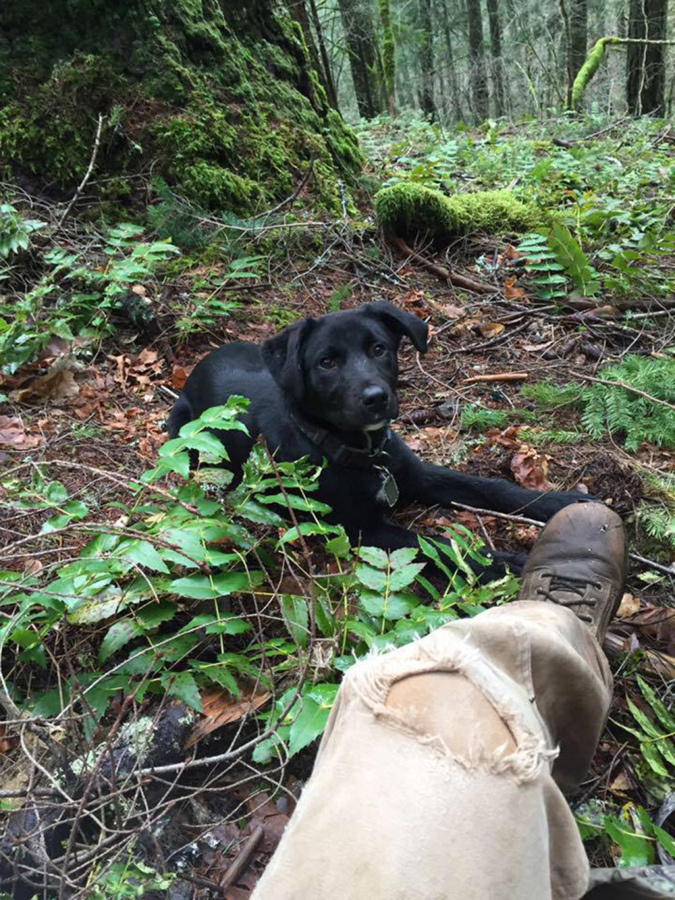The Humane Society for Southwest Washington faced a fiery online backlash after giving up for adoption a dog that had run away while his firefighter owner was away for work.
In a Tuesday post on the Humane Society’s Facebook page, William Jones said his dog, a black Lab named Hunter, had gone missing while he was in Eastern Washington working as a firefighter.
“I left him with a friend ’cause I knew I would be gone for a few weeks,” wrote Jones, of Battle Ground, adding he had no way of knowing Hunter jumped a tall fence and ran off.
He returned to find the dog had been picked up by animal control, then adopted by another family.
“I called the Humane Society so I could get Hunter out. They told me that he was adopted and there’s nothing they could do about it,” he wrote.
Jones did not immediately return messages seeking further comment. Hundreds of angry commenters, many from out of state, have since flooded the Humane Society’s Facebook page, demanding Hunter be brought back to Jones.
As of Friday afternoon, Jones’ post had been shared thousands of times, and hundreds of people have left angry, one-star reviews on the Humane Society’s Facebook page.
In a response, the Humane Society said the dog was found without a chip or collar to help identify him.
The organization also sent an email to its sponsors Friday about what happened.
Animal control officers found the dog a few weeks ago, and aside from having a chipped tooth and being a bit underweight, he was healthy, Humane Society President Stacy Graham said.
Humane Society staff then started their procedure — they have five pages of protocols, she said — for dealing with stray animals.
Any ID-less animal they find, they keep for a three-day “stray hold,” she said. If they have tags or a chip, it’s five.
Staff posts photos of the animals on the Humane Society’s website and social media accounts, and they scour all the Craigslist listings and local lost-and-found social media pages to try to match animals they’ve found with those people have lost.
They dubbed the dog Mick for the Humane Society’s available-for-adoption photos.
After the three-day holding period ended, shelter staff started the customary round of behavioral evaluations, medical examinations and medical procedures to make sure Hunter was ready for adoption.
That took another three days, Graham said. On the seventh day the Humane Society had him, they put Hunter up for adoption, and a new family picked him up on the 10th day.
No one came forward, and no report of a missing Lab like Hunter was made, over those 10 days, she said.
“Then, of course, we discovered from a post on our Facebook page that William had been fighting a wildfire,” she said. “And so we immediately contacted him through Facebook and then via email to talk about what had happened.”
At this point, she said, there’s little the Humane Society can do.
Legally, when a dog is picked up by animal control, it becomes the responsibility of animal control. At the end of that three- or five-day held period, the animal belongs to the Humane Society, she said. When it’s adopted by new owners, “ownership” of the pet goes to them.
Often, when people are thinking about adopting a stray, they’ll ask whether they’ll ever get a call from the Humane Society months or years later saying the original owner has been found.
“We don’t call the adopting family back,” she said, adding the pet owners’ personal information is kept confidential. “We did in this case because the dialogue on Facebook was, kind of, escalating, and because we wanted to alert them of that.”
Graham said the Humane Society asked the new owners whether they’d be willing to part with Hunter, but they declined, saying they’d bonded with the animal.
“For us this is an absolutely devastating, tragic event,” she said. “Nobody here can remember anything like this happening before.”
The Humane Society takes in 6,000 to 7,000 animals every year, and the process is the same, she said.
On Facebook, the Humane Society urged pet owners to get microchips or register their animals. Many commenters accused the Humane Society of trying to sell chips, Graham said, but the fact is they work.
The Humane Society reunited 814 animals, mostly dogs, with their families last year.
“It’s terrible. It’s so sad, but we have these policies in place to protect everybody along the way,” she said.




